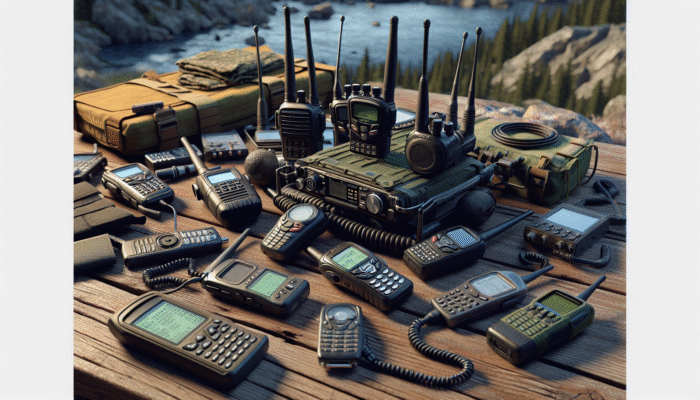Enhancing Survival Odds with Reliable Communication Devices for Preppers
In the ever-changing landscape of emergencies, prepper communication devices play a crucial role in ensuring survival and promoting effective teamwork among individuals and groups. These devices are designed specifically to function in situations where conventional communication networks may be rendered useless, thereby establishing essential links necessary for safety and collaboration. By thoroughly exploring the various types of communication devices, understanding their significance, and learning optimal maintenance practices, preppers can make well-informed decisions that greatly enhance their preparedness and resilience in the face of adversity. This acquired knowledge empowers preppers to handle crises with assurance and effectiveness, significantly improving their overall survival strategies.
Diving into the Diverse Array of Available Communication Devices

The extensive range of available prepper communication devices addresses a variety of needs and preferences, ensuring that every prepper can discover a suitable solution tailored to their specific circumstances. Leading this varied category are two-way radios, which include Walkie-Talkies and GMRS (General Mobile Radio Service) radios. These devices facilitate short-range communication among groups, proving critical during local emergencies by enabling swift coordination of actions. For individuals requiring long-distance communication, ham radios offer a robust alternative. Operating on amateur radio frequencies, these radios can send messages across vast distances, making them indispensable for emergency communications, especially in remote or isolated areas where other communication methods may be unavailable or unreliable.
Satellite phones represent another essential tool, offering dependable communication when terrestrial networks are disrupted or entirely unavailable. These phones connect directly to satellites orbiting the Earth, proving invaluable during natural disasters or in remote locations like wilderness expeditions. Furthermore, shortwave radios enable access to international broadcasts, including emergency alerts and news updates, making them a critical asset for maintaining awareness and staying informed amidst the chaos and uncertainty of emergency situations.
Understanding the Critical Role of Effective Communication in Emergencies
The significance of effective communication during emergencies cannot be overstated; it can truly be a matter of life and death. In times of crisis, the prompt and clear exchange of information allows individuals to coordinate rescue efforts, make informed decisions, and remain aware of evolving threats. Prepper communication devices act as the backbone of these vital interactions, enabling groups to maintain contact and share crucial information that directly influences their safety and overall survival.
Imagine a natural disaster scenario where conventional communication systems fail. In such dire situations, having reliable devices can facilitate evacuation plans, resource distribution, and updates on safety measures. Moreover, effective communication fosters a sense of community and support during crises, significantly reducing stress and ensuring a unified approach to overcoming challenges. By prioritising effective communication, preppers can dramatically improve their chances of navigating emergencies successfully, highlighting the critical importance of being well-prepared.
Selecting the Ideal Communication Device to Meet Your Unique Needs
Choosing the most appropriate prepper communication device depends on several crucial factors, including range, durability, and ease of use. Range is particularly vital; devices should have the ability to transmit signals over sufficient distances to cover the intended operational area. For example, if a group is planning an extended camping trip in a remote wilderness area, they should select devices with long-range capabilities, such as ham radios or satellite phones.
Durability is another essential consideration, as the challenges encountered during emergencies can be extreme. Devices must endure harsh weather conditions, moisture, and physical impacts. It is advisable to choose options that are rated for rugged environments or specifically designed for outdoor use. Lastly, user-friendliness is critical; overly complex devices may impede communication in high-pressure situations. User-friendly interfaces and intuitive controls can significantly impact communication efficiency when every second counts during an emergency, ensuring that individuals can convey messages quickly and effectively.
Implementing Essential Maintenance Practices for Communication Devices

To ensure that prepper communication devices remain in peak working condition, regular maintenance is absolutely essential. This includes conducting routine inspections for any signs of damage, performing functionality tests, and thorough cleaning. Dust and moisture can severely affect devices, potentially leading to failures at the most critical moments. For instance, if a radio has been exposed to harsh environmental conditions, moisture can corrode internal components, rendering it unusable when it is most needed.
Battery management is another crucial component of device maintenance. Many communication devices rely on batteries, which can deteriorate over time. Regularly checking battery health and ensuring that spare batteries are available can help avert potential communication failures. For devices that support rechargeable batteries, establishing a charging routine—especially one that incorporates solar chargers—can significantly extend their operational lifespan and reliability during emergencies, ensuring that preppers remain connected when it matters the most.
Establishing Clear and Strategic Communication Protocols for Preppers
Creating clear communication protocols is foundational for prepper communication devices to function effectively. These protocols should define how devices are to be utilised, including guidelines on when to communicate, what types of information should be shared, and how to signal emergencies. This becomes especially critical in group scenarios where multiple individuals depend on each other for safety and coordination during crises.
Training sessions should include drills where these protocols are practised, ensuring that every member understands their specific roles and responsibilities. Furthermore, implementing a code system for communication can enhance security, safeguarding sensitive information from potential interception. By investing time and resources into these protocols, preppers can ensure a streamlined and effective exchange of information during emergencies, thus improving their chances of survival and mission success.
Maximising Radio Communication for Preppers
Among the spectrum of prepper communication devices, radio communication stands out as a powerful means of maintaining contact during emergencies. Various forms of radio technology cater to different communication needs, ranging from short-range family communication to long-distance emergency broadcasts, making them indispensable for those preparing for unexpected situations.
Utilising Ham Radios for Effective Long-Distance Communication

Ham radios, also known as amateur radios, serve as a lifeline for long-distance communication. They operate on designated frequencies allocated for non-commercial use, enabling users to connect over extensive distances, often reaching hundreds of miles. This capability becomes particularly advantageous during emergencies when other telecommunication methods may be unavailable or compromised.
One of the most significant benefits of ham radios is their independence from conventional commercial networks. During disasters, when infrastructure may be severely damaged, ham radio operators can establish their own networks, providing critical communication links. Numerous ham operators participate in emergency communication groups that assist in coordinating rescue efforts and disseminating vital information to affected areas, making them invaluable resources for community safety and support.
To operate a ham radio effectively, proper training and licensure are required, which adds a layer of responsibility. However, the investment in learning can pay off tremendously during critical situations. Mastering the use of this technology ensures that individuals are equipped to call for help or provide assistance to others in distress, solidifying ham radios as a cornerstone of effective emergency communication strategies.
Harnessing GMRS Radios for Family and Group Communication
General Mobile Radio Service (GMRS) radios are specifically designed for family and group communication, making them ideal for preppers who aim to maintain contact during localized emergencies. GMRS radios operate on designated UHF frequencies and provide a more extensive range compared to standard walkie-talkies, often reaching several miles depending on terrain and environmental conditions.
One of the standout features of GMRS radios is their ease of use. Most models come pre-programmed with channels, enabling users to communicate with minimal setup. This accessibility makes GMRS radios suitable for a broad audience, ensuring that even those with limited technical expertise can maintain contact during crises.
Additionally, GMRS radios support repeaters, which can significantly extend their range. Preppers can establish a repeater station to amplify signals, ensuring communication over larger distances and enhancing group coordination. For families venturing into the wilderness or preparing for potential urban challenges, GMRS radios offer a versatile and effective communication solution that is both practical and reliable, reinforcing their emergency preparedness.
The Vital Role of Shortwave Radios in Emergencies
Shortwave radios form an essential component of prepper communication devices due to their ability to receive international broadcasts and emergency alerts. By capturing signals that bounce off the ionosphere, these radios connect users to a wealth of information from around the globe, including news updates and critical emergency announcements.
During significant events—such as natural disasters, political unrest, or other global incidents—access to accurate information is crucial for informed decision-making. Shortwave radios can provide updates on evolving situations, enabling preppers to make timely decisions regarding their safety and necessary actions. Additionally, many shortwave radios now include features like USB charging ports, allowing users to power their devices even during extended outages, further enhancing their utility and effectiveness.
There is also a strong community aspect to shortwave radio usage. Operators frequently exchange information and updates, creating a network that fosters collaboration and support. For preppers, engaging with this community can enhance their knowledge, preparedness, and overall communication strategies, making shortwave radios a multifaceted resource for information dissemination and community connection.
Assessing Satellite Communication Solutions for Preppers
When conventional communication channels become unreliable, satellite communication options emerge as vital lifelines for preppers. These devices offer essential connectivity, ensuring that individuals can stay in touch even in the most remote or disaster-stricken areas, thereby reinforcing their preparedness strategies.
The Essential Functionality of Satellite Phones
Satellite phones are crucial for maintaining communication when terrestrial networks fail. Unlike traditional mobile phones that depend on cellular towers, satellite phones connect directly to satellites, ensuring a signal even in the most isolated locations. This capability is especially critical for preppers engaged in outdoor activities or residing in areas susceptible to natural disasters, where conventional communication may falter.
The reliability of satellite phones during emergencies cannot be overstated. They facilitate voice calls and, in many cases, text messaging, providing essential lines of communication with emergency services or loved ones. However, it is crucial to understand the operational requirements, such as maintaining a clear line of sight to the sky, as obstructions can significantly affect signal quality.
When selecting a satellite phone, preppers should evaluate features like battery life, durability, and additional functionalities, such as GPS tracking capabilities. Many satellite phones are designed to endure harsh conditions, making them ideal companions for outdoor adventures or for emergency preparedness. Investing in this technology represents a commitment to maintaining dependable communication amidst chaos and uncertainty, ensuring that preppers can stay connected when it matters most.
Satellite Messengers for Quick and Effective Communication
Complementing satellite phones, satellite messengers are compact devices specifically engineered to send and receive text messages and GPS coordinates, even in the most remote locations. They leverage satellite connectivity to provide an easy-to-use solution for swift communication when traditional methods fall short.
One of the key benefits of satellite messengers is their versatility. Many feature SOS buttons capable of sending distress signals along with GPS coordinates to emergency responders, which can be invaluable in life-threatening situations. This functionality allows preppers to communicate their precise location and request assistance, thereby enhancing their safety and prospects of survival during emergencies.
Moreover, many satellite messengers offer features that enable users to send messages to family and friends, ensuring that loved ones are kept informed about their well-being. This capability alleviates stress and fosters a sense of connection, even when separated by vast distances. For preppers venturing into the wilderness or preparing for potential disasters, satellite messengers represent a crucial addition to their communication toolkit, significantly enhancing their overall preparedness and response capabilities.
Utilising Satellite Internet for Reliable Connectivity
In an increasingly interconnected world, satellite internet services are transforming how preppers maintain connectivity during long-term emergencies. These services provide reliable internet access, even in areas where traditional broadband options are nonexistent, ensuring that users can access vital information and resources.
The importance of satellite internet becomes evident during crises when updates on weather conditions, emergency services, and safety protocols are crucial. With satellite internet, preppers can utilise online tools and resources that assist in planning and executing effective response strategies. This connectivity can be pivotal for families, allowing them to stay informed and make sound decisions in real time, which is vital for their safety and well-being during emergencies.
When choosing a satellite internet service, consider factors such as data limits, connectivity speed, and overall reliability. Some providers offer portable options, allowing preppers to maintain connectivity while on the move. Investing in satellite internet capabilities not only enhances a prepper’s readiness but also fosters adaptability during crises, empowering individuals and families to remain informed and connected, regardless of the circumstances they face.
Understanding the Advantages of Satellite Broadband Systems
Satellite broadband represents a powerful extension of satellite connectivity that provides high-speed internet access in regions lacking traditional infrastructure. For preppers, this technology translates to enhanced communication capabilities, allowing users to access vital information, coordinate with others, and share updates during emergencies.
Similar to conventional broadband, satellite broadband supports a variety of online activities, from browsing news websites to streaming educational content. This connectivity is crucial during emergencies, ensuring that preppers can access real-time information about evolving situations, which can significantly influence their safety and decision-making processes. Many satellite broadband services are designed to seamlessly integrate with existing devices, making the setup straightforward and user-friendly, thereby enhancing the overall user experience.
Furthermore, maintaining a reliable internet connection can significantly influence a prepper’s mental well-being during extended emergencies. Access to news, entertainment, and communication with loved ones can alleviate feelings of isolation and anxiety, contributing to overall resilience. Satellite broadband systems represent a strategic investment in preparedness, ensuring that individuals and families can remain informed and connected, no matter the circumstances they face during crises.
Utilising Satellite TV Services for Information and Entertainment
During prolonged emergencies, when conventional media may be disrupted, satellite TV services provide a crucial source of entertainment and information. These services offer access to a wide array of channels, ensuring that viewers can stay updated on news, weather, and emergency-related announcements.
One of the primary advantages of satellite TV is its resilience against disruptions. Unlike traditional cable systems, satellite TV relies on signals from satellites, making it less susceptible to outages caused by adverse weather events or infrastructure damage. For preppers, having access to dependable news and updates can be critical for making informed decisions during crises, thereby enhancing their preparedness and response capabilities.
Moreover, satellite TV can serve as a significant morale booster during challenging times. Access to entertainment options can relieve stress and provide a sense of normalcy amid chaos, helping individuals cope with difficult circumstances. Preppers should consider investing in portable satellite TV systems, which can be set up quickly in various environments, further enhancing their adaptability and communication capabilities during emergencies.
Leveraging Mobile Apps for Enhanced Emergency Preparedness
As technology continues to evolve, mobile apps have emerged as invaluable tools for preppers, offering real-time communication and situational awareness. These applications significantly enhance preparedness by equipping individuals with essential information and connectivity options during emergencies.
Utilising Emergency Alert Apps for Timely and Critical Information
Emergency alert apps are specifically designed to provide real-time information and warnings during disasters. These applications utilise data from various sources to keep users informed about severe weather alerts, natural disasters, and other critical events that may pose risks to safety.
For preppers, the significance of these apps lies in their ability to deliver timely notifications directly to users’ devices. This immediacy can be life-saving, enabling individuals to take swift action in response to imminent threats. Many emergency alert apps also provide safety tips and resources, empowering users to prepare for different scenarios and make informed decisions that can significantly affect their safety and well-being.
Moreover, some apps allow users to customise alerts based on their geographic location or specific interests, ensuring that they receive the most pertinent and relevant information. By integrating these emergency alert apps into their communication strategy, preppers can stay one step ahead, enhancing their awareness and overall readiness in times of crisis, ultimately improving their chances of survival.
Implementing Offline Messaging Apps for Resilient Communication
In scenarios where internet or cellular service is unavailable, offline messaging apps can be transformative for maintaining communication. These applications utilise Bluetooth and local Wi-Fi networks to enable users to send and receive messages without relying on traditional telecom infrastructure.
For preppers, having access to offline messaging capabilities means maintaining communication with group members even when conventional networks fail. This can be particularly advantageous during natural disasters or remote expeditions, where connectivity may be compromised. Apps like FireChat and Briar allow users to create mesh networks, facilitating communication without the need for an internet connection, thus enhancing their overall preparedness and communication effectiveness.
Additionally, offline messaging apps often prioritise security by encrypting messages to protect against unauthorised access. This aspect is crucial for preppers concerned about privacy during emergencies. By integrating offline messaging apps into their communication arsenal, preppers can ensure that they remain connected, informed, and secure when it matters most, thereby bolstering their overall resilience in challenging situations.
Utilising Map and Navigation Apps for Emergency Situations
Map and navigation apps are indispensable tools for preppers, providing crucial support for planning movements during emergencies. These applications offer detailed maps, route suggestions, and real-time navigation assistance, helping individuals navigate unfamiliar terrains or optimise evacuation routes effectively.
During emergencies, having access to accurate information about safe routes and locations can be vital for survival. Mapping applications like Google Maps and various offline alternatives ensure that preppers can identify critical resources such as shelter, food, and medical assistance. This capability can significantly influence the difference between safety and peril in rapidly changing situations, making these tools essential for effective emergency preparedness and response.
Moreover, many navigation apps allow users to share their locations with trusted contacts, enhancing group coordination during crises. This feature fosters a sense of community and support, ensuring that everyone can stay informed and connected. By leveraging map and navigation apps, preppers can enhance their decision-making capabilities and improve their overall readiness for emergencies, thus increasing their chances of survival in critical situations.
Powering Your Essential Communication Devices Efficiently
The efficiency of prepper communication devices relies not only on their technology but also on their power sources. Ensuring that these devices remain powered during emergencies is crucial for effective communication and overall preparedness.
Exploring Optimal Battery Options for Communication Devices
When selecting batteries to power prepper communication devices, understanding the various types available is essential for optimal performance. Common battery types include alkaline, lithium-ion, and rechargeable batteries, each offering unique advantages and limitations. Alkaline batteries are widely available and effective for short-term use; however, they may not be suitable for prolonged emergencies due to their limited longevity.
In contrast, lithium-ion batteries provide superior performance, with longer lifespans and the ability to retain a charge for extended periods. Thus, they are an excellent choice for devices that may not be used regularly or frequently. For preppers investing in rechargeable communication devices, lithium-ion batteries are typically the best option, as they can be recharged multiple times without significant degradation in performance over time, ensuring reliability during emergencies.
Additionally, having a variety of battery sizes on hand ensures flexibility for different devices. Preppers should also consider investing in battery management systems that monitor battery health and performance, facilitating timely replacements and maintenance. This proactive approach is essential for ensuring that devices remain functional during critical situations, ultimately enhancing overall preparedness and response capabilities.
Utilising Solar Chargers for Sustainable Power Solutions
Solar chargers are a vital component of a prepper’s power strategy, offering a sustainable and renewable energy source during extended outages. These chargers utilise solar panels to convert sunlight into electricity, allowing users to recharge their communication devices without relying on traditional power sources, which may be compromised during emergencies.
The versatility of solar chargers makes them especially appealing for preppers. They are portable, enabling users to charge devices in remote locations while on outdoor adventures or during emergencies. Many solar chargers come equipped with multiple ports, allowing for the simultaneous charging of several devices, thus enhancing their utility and practicality in critical situations.
When selecting a solar charger, consider factors such as wattage and compatibility with your devices. High-capacity chargers may be necessary for power-hungry devices, while smaller units can suffice for basic needs. Investing in solar chargers ensures that preppers maintain critical communication capabilities even in the face of prolonged power outages, thereby enhancing their overall preparedness and response strategies.
Hand-Crank Generators as Reliable Emergency Power Solutions
Hand-crank generators serve as a reliable backup power source for prepper communication devices, providing an invaluable solution for maintaining connectivity when conventional power sources are unavailable. These generators convert mechanical energy into electrical power, allowing users to generate electricity by simply cranking a handle, which can be a lifesaver during emergencies.
One of the primary advantages of hand-crank generators is their independence from fuel sources. In emergencies where gasoline or propane may be scarce, hand-crank generators ensure that users can still generate power. This technology is particularly useful for preppers focused on self-sufficiency and sustainability, reinforcing their preparedness strategies by ensuring they have the power needed to operate critical communication devices.
Moreover, hand-crank generators are typically compact and portable, making them easy to transport and store. They can power essential communication devices such as radios, phones, and GPS units, ensuring that preppers remain connected and informed during crises. By incorporating hand-crank generators into their power strategy, preppers enhance their resilience and adaptability in the face of unexpected challenges, reinforcing their overall emergency preparedness.
Securing Your Communication Channels Against Potential Threats
As communication technology evolves, so too do the threats to information security. For preppers, ensuring the security of their communications is essential to protect sensitive information and maintain coordination during emergencies. Implementing effective security measures can significantly enhance the safety and success of their preparedness strategies.
Implementing Robust Encryption Methods for Enhanced Communication Security
Employing encryption methods is a critical strategy for safeguarding communications from unauthorised access. Encryption transforms information into unreadable code, ensuring that only authorised parties can access the contents. For preppers, this means protecting sensitive details about locations, resources, and strategies during emergencies, which can be pivotal for their safety and success.
Various encryption techniques are available, ranging from simple password protection for messaging apps to complex encryption algorithms used in specialised communication devices. Preppers should prioritise tools and platforms that offer robust encryption features, ensuring that their communications remain private and secure.
Additionally, understanding the limitations of encryption is vital. While it can significantly enhance security, it is not foolproof. Preppers should combine encryption with other security practices, such as using secure messaging platforms and implementing strong password management strategies, to ensure comprehensive protection of their communications during emergencies, safeguarding their preparedness efforts effectively.
Ensuring Radio Frequency Privacy for Secure Communication
When utilising radio communication devices, minimising the risk of interception is crucial. Radio signals can be picked up by anyone with the proper equipment, making it essential for preppers to take proactive measures to protect their communications from unauthorised access and potential eavesdropping.
One effective strategy is to implement coded language or signals within group communications. This practice can obscure the contents of messages, rendering it difficult for unauthorised listeners to comprehend the information being exchanged. Regularly rotating codes can further enhance security by keeping potential interceptors guessing and protecting sensitive information shared during emergencies.
Consideration of radio frequency privacy is also vital during emergencies. Preppers should choose communication devices that offer secure frequencies and avoid using public channels for sensitive information. By prioritising radio frequency privacy, preppers can ensure that their communications remain secure and effective during crises, ultimately enhancing their chances of survival and success through well-planned communication strategies.
Utilising Secure Messaging Platforms for Confidential Communication
Secure messaging platforms are essential tools for preppers seeking privacy and security in their communications. These platforms leverage encryption and other security measures to protect user data, ensuring that sensitive information remains confidential and safe from prying eyes.
Popular secure messaging apps like Signal and WhatsApp offer end-to-end encryption, meaning that only the sender and recipient can access the content of messages. This feature is particularly crucial for preppers discussing strategies, resources, or sensitive information during emergencies, as it ensures that their communications are protected from unauthorised access and potential interception.
Additionally, secure messaging platforms often provide features like self-destructing messages and anonymity options, enhancing user privacy. By integrating these platforms into their communication strategies, preppers can ensure that their exchanges remain confidential and secure, fostering trust and cooperation within their groups, which is vital during emergencies when clear communication and collaboration are paramount.
Training and Practising Essential Communication Skills
Even the most advanced prepper communication devices require proper training to be effective. Regular practice and skill development ensure that preppers are prepared to utilise their devices efficiently during actual emergencies, which can significantly enhance their chances of survival and success in critical situations.
Conducting Regular Communication Drills for Enhanced Preparedness
Conducting regular communication drills is essential for ensuring that preppers are ready to respond effectively during emergencies. These drills simulate real-life scenarios, allowing individuals to practice using their communication devices and reinforce established protocols that are crucial for effective coordination in crises.
Drills can range from simple exercises—such as testing communication ranges and functionalities—to more complex simulations involving multiple group members. Practising these scenarios helps identify potential weaknesses in communication strategies and allows preppers to refine their approaches, ensuring that they are well-prepared for any situation that may arise.
Moreover, communication drills foster teamwork and collaboration, ensuring that every member understands their role in an emergency. This readiness can significantly enhance the effectiveness of communication efforts during crises, ultimately improving outcomes for everyone involved and reinforcing the importance of preparedness.
Developing Essential Skills for Effective Device Operation
Developing the necessary skills to operate various prepper communication devices is vital for ensuring effective usage during emergencies. This skill development encompasses understanding the technical aspects of devices, including settings, functionalities, and troubleshooting techniques that may be needed in high-pressure situations.
Training sessions should focus on familiarising users with the devices they will rely on during emergencies. For instance, individuals should practice setting up and using ham radios, GMRS radios, and satellite phones, ensuring they can operate them intuitively when needed, thereby maximising their effectiveness during critical situations.
Additionally, exploring online resources, workshops, and community training can enhance knowledge and skills related to communication devices. By investing time in skill development, preppers can ensure that they are equipped to utilise their communication devices effectively, maximising their chances of success during emergencies and enhancing their overall preparedness strategies.
Engaging in Scenario-Based Training for Real-World Challenges
Scenario-based training is an effective method for preparing preppers for real-world communication challenges. By creating simulations that mimic potential emergency situations, preppers can practice their responses and refine their communication strategies effectively.
These scenarios can include various factors, such as limited time, unexpected disruptions, and changing conditions. For example, a training exercise might involve a sudden weather event that disrupts communication channels, requiring participants to adapt quickly and utilise alternative devices or methods to maintain contact and coordination.
Engaging in scenario-based training fosters critical thinking and adaptability, ensuring that preppers are prepared to think on their feet when faced with uncertainties. By practising these strategies, preppers develop the skills necessary to navigate challenging situations and maintain effective communication during crises, ultimately improving their chances of survival and success in emergencies.
Implementing Regular Evaluation and Feedback Mechanisms
Regular evaluation and feedback are integral components of effective training for prepper communication devices. Assessing performance during drills and training exercises allows individuals to identify strengths and areas for improvement, ultimately enhancing communication effectiveness and overall preparedness.
Feedback mechanisms can include peer assessments, self-reflection, and group discussions focused on communication strategies. By creating an open environment for sharing insights and experiences, preppers can learn from one another and refine their tactics, ensuring that everyone is on the same page and prepared for emergencies.
Incorporating evaluations into regular training routines ensures that preppers remain vigilant and adaptable. As conditions change, so too should communication strategies, making ongoing evaluation a cornerstone of effective preparedness and enhancing overall readiness during emergencies.
Maintaining Optimal Condition for Communication Devices
Proper maintenance of prepper communication devices is essential for ensuring they remain operational when needed most. Regular upkeep can prevent malfunctions and prolong the lifespan of devices, significantly enhancing overall preparedness and response capabilities.
Conducting Routine Inspections for Device Readiness
Conducting regular inspections of communication devices is vital to ensure functionality and readiness. Preppers should create a routine for checking devices for wear and tear, confirming that all components are working correctly. Look for signs of damage, corrosion, or battery depletion—these issues can compromise performance during emergencies and must be addressed promptly to ensure reliability.
Inspections should also include testing device capabilities, such as range and clarity of communication. Regularly using the devices in varied conditions will help users become familiar with their performance limits, ensuring they understand how far they can communicate effectively and making necessary adjustments or repairs as needed.
By prioritising regular inspections, preppers can stay ahead of potential issues and ensure their communication devices are ready for use whenever necessary, enhancing their overall preparedness and response strategies during critical situations.
Implementing Proper Cleaning Techniques for Device Longevity
Cleaning communication devices is a crucial maintenance step that is often overlooked. Dust, grime, and moisture can accumulate on devices, impacting their performance and longevity. Implementing proper cleaning techniques ensures that devices remain functional and reliable over time, especially when they are needed most.
Begin by following manufacturer guidelines for cleaning, ensuring that no moisture enters sensitive components. Use soft cloths and gentle cleaning solutions to wipe down surfaces, focusing on buttons and connectors. For devices exposed to outdoor elements, additional attention may be required to prevent corrosion and damage, which can compromise their effectiveness during emergencies.
Routine cleaning not only enhances device performance but also contributes to the overall hygiene and usability of communication tools. Preppers should incorporate cleaning into their maintenance schedules to ensure their devices remain in optimal condition, ready for any situation that may arise during emergencies.
Staying Updated with Software Maintenance for Enhanced Security
Keeping the software of communication devices up to date is essential for enhancing security and functionality. Manufacturers often release updates that address security vulnerabilities, improve performance, and introduce new features that can enhance the user experience.
Preppers should regularly check for software updates and ensure that their devices are running the latest versions. This practice helps prevent potential security breaches and enhances the overall user experience. Additionally, some devices offer automated updates, allowing preppers to set their systems to update automatically, thus reducing the burden of manual checks and ensuring they are always equipped with the latest tools and protections.
By prioritising software maintenance, preppers can ensure their communication devices are optimised for performance and security, ultimately enhancing their preparedness for emergencies and unexpected situations that may arise.
Frequently Asked Questions About Prepper Communication Devices
What are prepper communication devices?
Prepper communication devices are tools specifically designed for effective communication during emergencies, ensuring connectivity when traditional networks fail. These devices include radios, satellite phones, and messaging apps, enhancing coordination and information exchange among individuals and groups, which is vital for survival.
Why is communication crucial during emergencies?
Effective communication is crucial for survival in emergencies. It facilitates coordination, information sharing, and decision-making, helping individuals and groups respond effectively to threats and challenges that may arise during crises, thereby improving their chances of safety and success.
What types of radios are suitable for preppers?
Suitable radios for preppers include ham radios for long-distance communication, GMRS radios for family coordination, and shortwave radios for accessing international broadcasts and emergency alerts, which are vital for staying informed during emergencies and ensuring effective communication.
How do satellite phones function?
Satellite phones connect directly to satellites orbiting the Earth, allowing users to communicate even when terrestrial networks are down. They are essential for reliable communication in remote areas or during disasters, ensuring that individuals can stay connected and informed when it matters most.
What are the advantages of using emergency alert apps?
Emergency alert apps provide real-time information and warnings during disasters, helping users stay informed about evolving threats and necessary actions. They enhance preparedness and response capabilities, ensuring that individuals are ready to act when needed, which is critical for safety and survival.
How can I keep my communication devices powered effectively?
You can power communication devices using various battery options, solar chargers, and hand-crank generators. Each option offers unique benefits, ensuring that devices remain operational during emergencies, which is crucial for effective communication and preparedness strategies.
What is the importance of encryption for communication?
Encryption protects communications from unauthorised access, ensuring that sensitive information remains confidential. For preppers, utilising encrypted communication tools is vital for security during emergencies, safeguarding their strategies and resources from potential interception and unauthorised access.
Why should I conduct communication drills?
Conducting communication drills ensures readiness during emergencies by allowing preppers to practice using their communication devices and refine established protocols. They enhance coordination and effectiveness in real-life situations, ultimately improving outcomes for everyone involved and strengthening overall preparedness.
How often should I inspect my communication devices?
Regular inspections should be conducted routinely—ideally every few months or before significant trips—to ensure communication devices are functional and free from damage. This proactive approach maximises readiness and effectiveness during emergencies, ensuring that individuals can rely on their devices when needed.
What maintenance practices should I follow for my devices?
Regular maintenance practices include conducting inspections, cleaning devices, keeping software up to date, and managing battery health. This comprehensive approach ensures optimal performance and longevity of communication tools, which is essential for effective preparedness and response during emergencies.
Explore our world on X!
The post Prepper Communication Devices: Essential Tools for Survival appeared first on Survival Bite.
The Article Communication Devices for Preppers: Essential Survival Tools Was Found On https://limitsofstrategy.com
The Article Communication Devices for Preppers: Key Survival Gear First Appeared ON
: https://ad4sc.com









Comments are closed